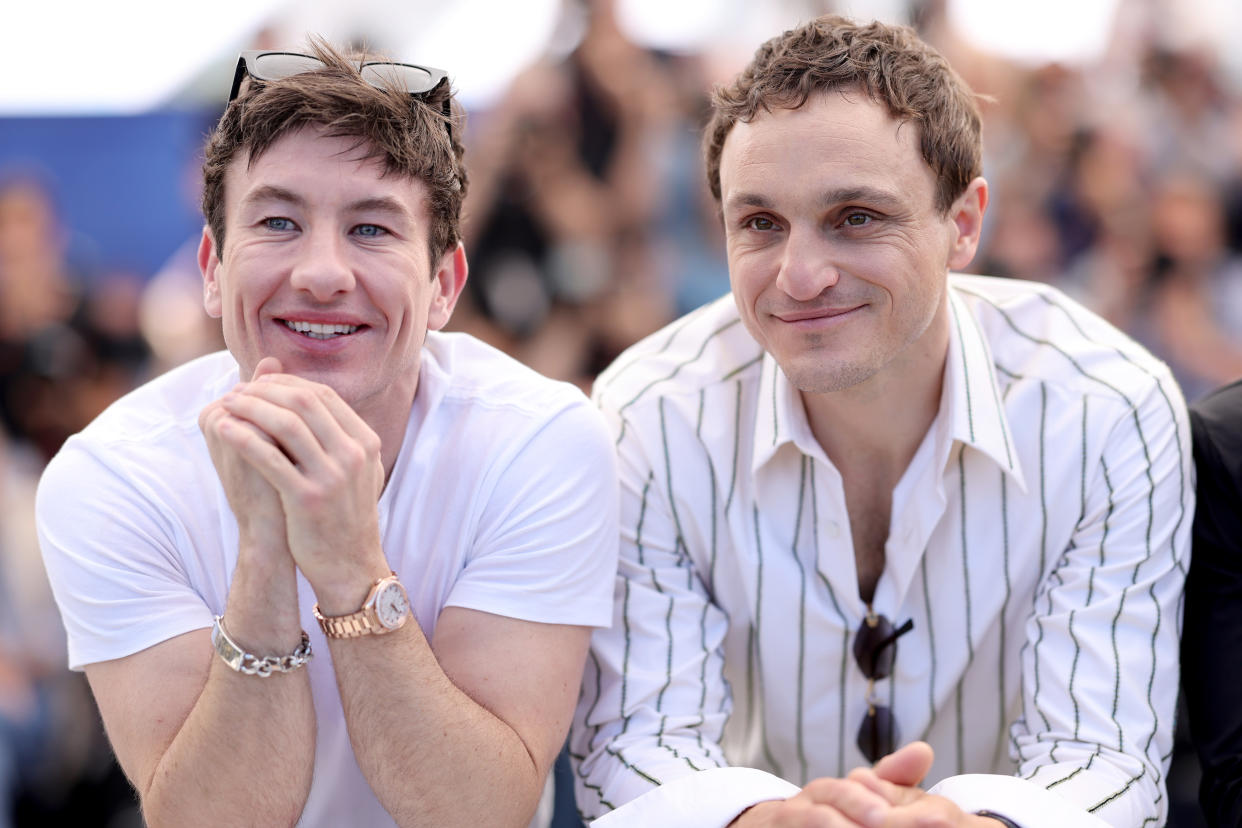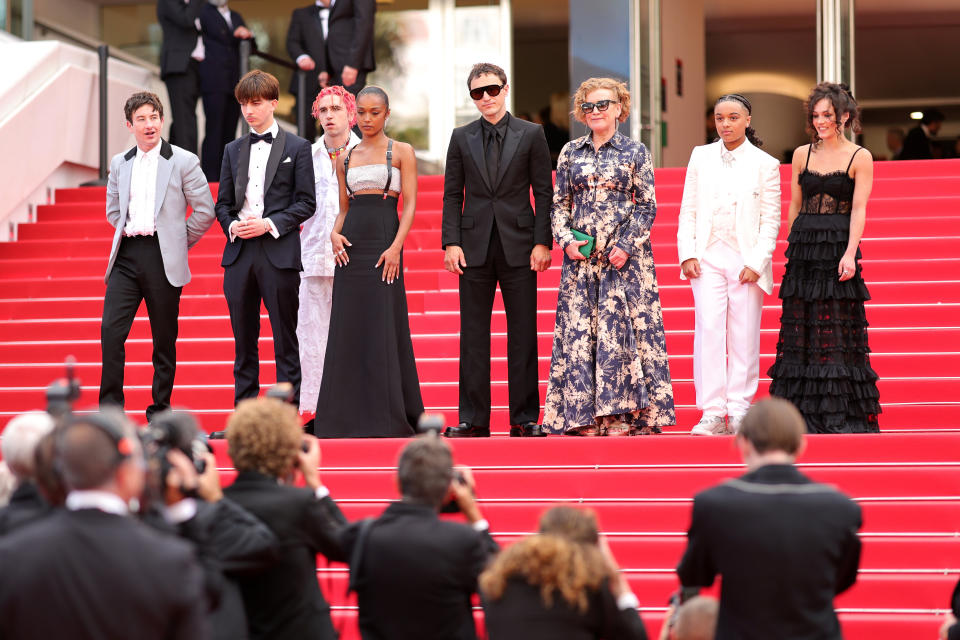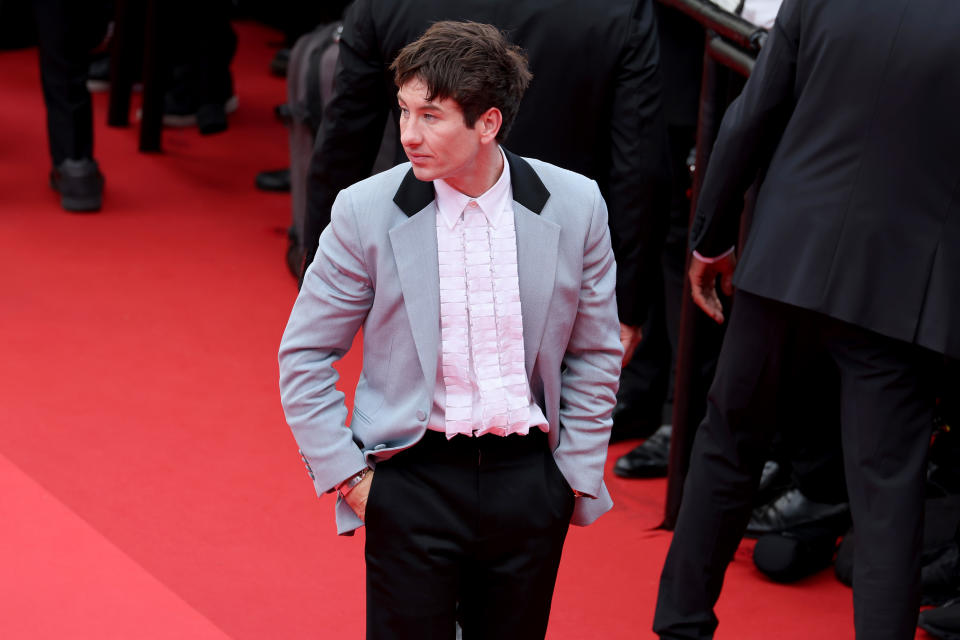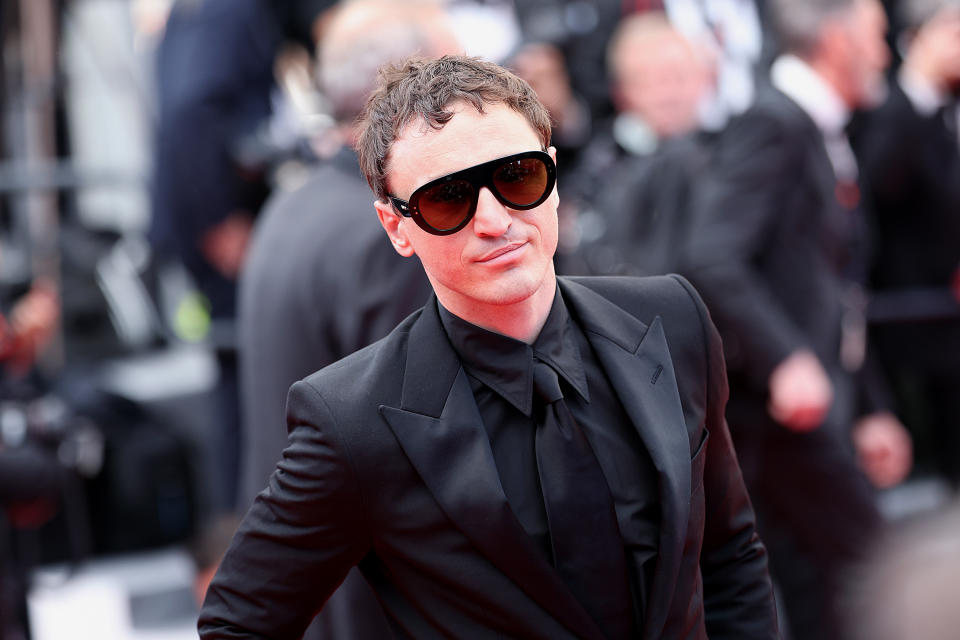Barry Keoghan and Franz Rogowski on Andrea Arnold, Frog Poison, and First Meeting at the ‘Bird’ Makeup Truck

Franz Rogowski and Barry Keoghan are only in one scene together in Andrea Arnold’s “Bird,” but you wouldn’t know it seeing them together at Cannes.
Rogowski, the breakout New York Film Critics-winning lead of “Passages,” and Keoghan, the Oscar-nominated “Banshees of Inisherin” star turned “Saltburn” meme machine, play roles in “Bird” that demanded a lot from the actors without much in the way of a script. The Cannes competition premiere centers on 12-year-old Bailey (newcomer Nykiya Adams), coming of age and confused about her identity on the fringes in a middle-of-nowhere England, living with her father Bug (Keoghan) on the other side of town from her mother and two sisters. And on the verge of puberty.
More from IndieWire
Barely coping with life and the news that her father is about to marry a woman he’s known for only three months, Bailey meets Bird (Rogowski), a vagabond who drifts into her life as if from the ether. The bond they form forces Bailey to confront the strained relationship with her estranged parents, and realize her own selfhood as a soon-to-be-teen girl in the process. The adults, not the kids, are the problem here.
The buzzy sales title could be Andrea Arnold’s first Palme d’Or win after only Cannes jury prizes in her career so far, for “Red Road,” “Fish Tank,” and “American Honey.” “Bird,” her most heartwarming film to date, is still not without its prickles. Bug, played by a tattoo-covered Keoghan less fit than as his sociopathic “Saltburn” social climber filmed the year prior, is a less-than-ideal parent to Bailey. Her mother is elsewhere shacked up with an emotionally tyrannic loser. Bird — played by Rogowski with his usual unassuming, even ASMR-inducing gentle aura — is really her only friend in an otherwise lonely life where she’s forced to fend for herself.
Arnold, too, asked her actors to fend for themselves, with characters formed in real time without a proper script. “We are colors … in the painting that she’s created,” Rogowski told IndieWire at Cannes.
Keoghan channeled his own upbringing in an economically depressed Summerhill, Dublin, to play Bug, which was all the prep he needed. Rogowski, meanwhile, said at the Cannes film festival press conference for “Bird” (via Variety) that “it would have been great sometimes if there was a bit more trust” given the otherwise psychologically loose approach to the production. Many handlers for animals, underage actors, and intimate scenes were involved.
“Bird” shot around the south of England in summer 2023, and Rogowski, speaking to IndieWire last year about “Passages,” previously described the atmosphere like this: “[Andrea Arnold] would wait for the right moment to come, like a hunter, for hours and hours to wait for a bunch of kids to calm down until they could walk across a meadow and own the meadow and be in their own territory instead of being forced to pretend to do something naturally. And that’s her message.”
Still, actors Keoghan and Rogowski bonded despite their limited on-camera time together. They both spoke to IndieWire in person at Cannes on the terrace of the festival Palais on a sunny late afternoon, the end of a long day of press. “The frog questions were new,” Rogowski said at the end of our conversation.
The following interview has been condensed and edited for clarity.
IndieWire: You two share almost no screen time together in “Bird.” When did you finally first meet?
Franz Rogowski: We saw each other in the makeup truck, and hugged and expressed our love interest in each other.
Barry Keoghan: I loved him at that moment. I’m a massive fan of Franz and we actually, funny enough, share the same agent, so I am always wondering what he’s doing or if there’s anything I can get on. And this just came together where I wasn’t even trying to work together.
Barry, your character Bug lives in this dilapidated squat in northern Kent, while Franz, your character Bird spends a lot of time wandering the English moorlands. What were these sets like in real life?
Keoghan: The sets are real locations. Andrea [Arnold] goes into these communities or these environments and it’s like she has this pass to do it. People accept and trust her. You don’t really have to imagine or force yourself to believe certain things. The location does a lot for you.

Rogowski: I totally agree. She creates a world in which you can just allow yourself to respond to whatever she creates. Sometimes, you’re also not fully prepared, so you don’t really know what’s going to happen. You might have a couple of lines, but you might also just enter a room, and you have a simple task to get close to someone or to protect somewhere, or to go somewhere or to be on a hunt or whatever it might be.
The character is not just us and our world that we live in, isolated from the rest, but we are also, let’s say, colors in the painting that she’s created. And that’s a pretty powerful experience as an actor. You wonder, “OK, fuck, how am I going to be purple? I am red, so how am I going to become purple?” And it’s impossible. But then you pretend purple, and you wear some purple clothes, but underneath you’re still red. And the experience with her is that she tells you, “Look, you’re red, and that’s perfect, and I am going to combine you with other colors. And then we mix them in front of the camera. So don’t worry, just be red and your color is perfect.” That allows you to explore from there and bring yourself and not deny who you are.
Franz, we spoke circa “Passages” about “Bird,” and you said that Andrea Arnold will wait “like a hunter” to get the right shot. Which often means a lot of waiting around. Did you need to have patience as actors on this set?
Keoghan: You don’t have a trailer to go to, which I prefer, and I really truly mean that. You’re in the deep end of it with everyone else. She doesn’t give you a script. You don’t have lines to learn. It’s just pure, spontaneous, and instinctive. She’s almost trying to break you down in the gentlest way so you can be honest and truthful. You don’t have time to wait around. You don’t want time to wait around, either. Once [cinematographer Robbie Ryan] gets that camera going, you want to just be in front of it.
Rogowski: For an actor, the art of waiting is quite essential. You can easily get stuck on a set for hours not knowing when you will finally start working.
Keoghan: That’s what you’re paid for. That shit.
Rogowski: You’re paid to maintain that energy. It’s a bit like a hundred meter runner that’s there in position but the shot never comes. You somehow have to relax in this position and find your comfort. The art of waiting is something I’m totally not capable of in real life. It drives me insane if I don’t know what to do. I do all kinds of silly things to numb myself or to just label it or whatever. With [Andrea Arnold], you can’t. You are a silent hunter with her.
Barry, there’s a rumor you dropped out of “Gladiator 2” to star in “Bird” for Andrea Arnold, a director you’ve long said many times you wanted to work with. Is that true?
Keoghan: [Demurring] Um, conflicts, schedule conflicts. I am a massive fan of “Gladiator” and a massive fan of that cast. It’s a shame you can’t do both. But that happens in this game. You can’t do both.
Rogowski: I think sometimes it’s also due to productions that play little power games and then you just have to say, “OK, bye bye.” But it’s unnecessary. It’s very rare that you really can’t do both. Most of the time, it’s two productions claiming they’re right and pretending that they can’t change schedule.
Keoghan: It always happens. Shooting in two different countries as well makes it really difficult.

Readying for something like Ridley Scott’s “Gladiator” sequel is physically a very different preparation than for an Andrea Arnold movie.
Keoghan: [“Bird”] has been the most artistic experience ever for me as an actor. I hope it shows onscreen. I don’t like to say there’s any composure of an actor up there on screen. I am totally immersed, and I feel the approach is in an unstructured way. Andrea creates that and sets that documentary style, and you can only be truthful to it. You kind of get found out if you’re acting.
Barry, was there anything personal you could draw from for this role?
Keoghan: I went in totally unknown to the whole [Andrea Arnold] process, and I loved it. I want to be spontaneous. I want to fail. I want to dig deep, be vulnerable. There’s a lot I could draw from. There’s a lot of similarities [between Bug and I] and a lot I can access, I hate to say.
Franz, your character is almost a figment of Bailey’s imagination. How did you prepare to play this kind of ephemeral character?
Rogowski: People enjoy watching intense faces on the screen while eating popcorn. But there is also a world and a life that these intense faces come from and usually also has to do struggle and certain amount of pain. And to actors that know their friends and know their lives, it’s sometimes absurd to see a struggling artist onscreen wearing a costume. And then you pretend that it’s World War II, but it’s not. It’s a person in crisis wearing a costume. But it works.
I don’t want to say that in a mean way because we bring our life to the table, and we use our psyche, our background story, our childhood, the traumas that we have and the colors that we’ve collected so far. And if you ask me, “How did you become Bird?” I mean, it took me 38 years.
Keoghan: We do pour everything in. Everyone in this game does. I remember saying to someone, “I’m not an entertainer, but people watch us for entertainment.” If that makes sense.
Andrea Arnold has a gift with first-time actors, especially young ones. What did you observe about her collaboration with Nykiya Adams?
Rogowski: You should obviously ask [Nykiya], and she will tell you much better and more precisely what it was all about working with Andrea. She brought her own story, her own quality, and also this kind of rigorous, very centered, grounded, stubborn coming-of-age energy. That is part of her story. And you have to ask her where it comes from, but that is something that she brought. It’s a color that she could always rely on.
Andrea was trying to use that to support her, sometimes manipulate her, but in a creative way. Then, you see it’s a bit like alchemy. You try to do a little thing and see, OK, how does she respond? They went onto that journey together, and it brought them here. And Nykiya is much more than the part that she’s been playing in this film, but that is part of her persona and her psyche, her quality. So I guess what you see on screen is a mixture of Andrea and Nykiya figuring it out together.

Barry, can you talk about the frog that your character promises will produce a psychotropic effect when it slimes? You’re holding this animal while a bunch of guys sing-scream Coldplay’s “Yellow” at it in one scene.
Keoghan: Andrea … has a way of working with animals that you feel connected to. Look at [the documentary] “Cow.” It’s a story about cows, and it had me glued.
Rogowski: I have to admit, I’ll be on a retreat in two weeks from now, and it’s a two-day thing, and there’s some frog poison involved. Apparently it helps to cleanse your body.
Keoghan: Cleanse yourself with poison.
Rogowski: It’s an interesting technique, but it apparently works.
Keoghan: The poor old frog [in “Bird”] you think for, and I really mean that. There’s a lot of lads chanting, and this fucking little thing is probably frightened to death. But again, there’s a handler there, and the frog is taken care of. I’m not even trying to be funny by saying that, but you’ve got to be very cautious of these things. … When we didn’t have to use the frog, we wouldn’t. It’d be a replica.
“Bird” premiered at the 2024 Cannes Film Festival. It is currently seeking U.S. distribution.
Best of IndieWire
Every Palme d'Or Winner from the Cannes Film Festival, Ranked
The 13 Best Thrillers Streaming on Netflix in May, from 'Fair Play' to 'Emily the Criminal'
The Best Father and Son Films: 'The Tree of Life,' 'The Lion King,' and More
Sign up for Indiewire's Newsletter. For the latest news, follow us on Facebook, Twitter, and Instagram.
